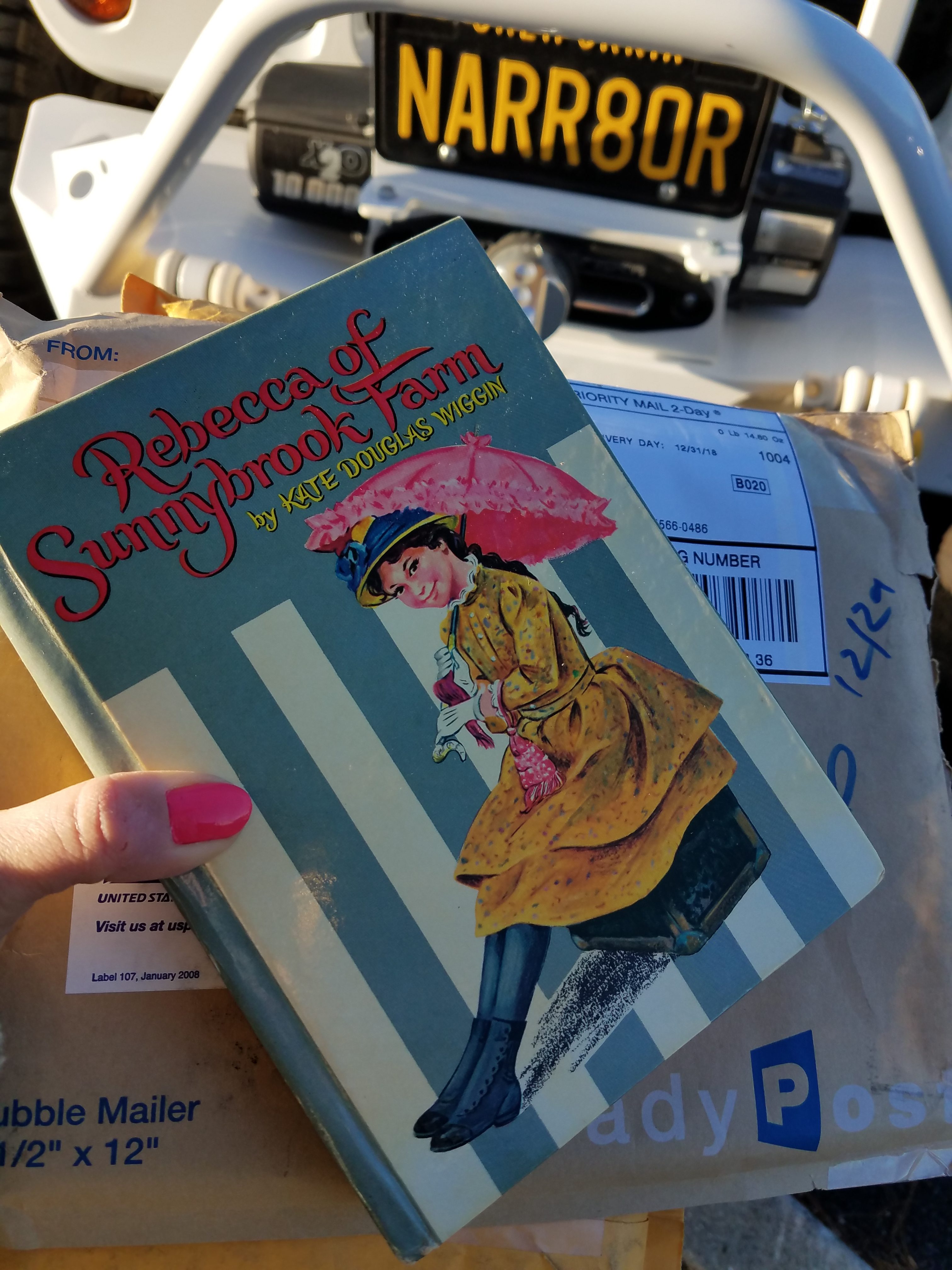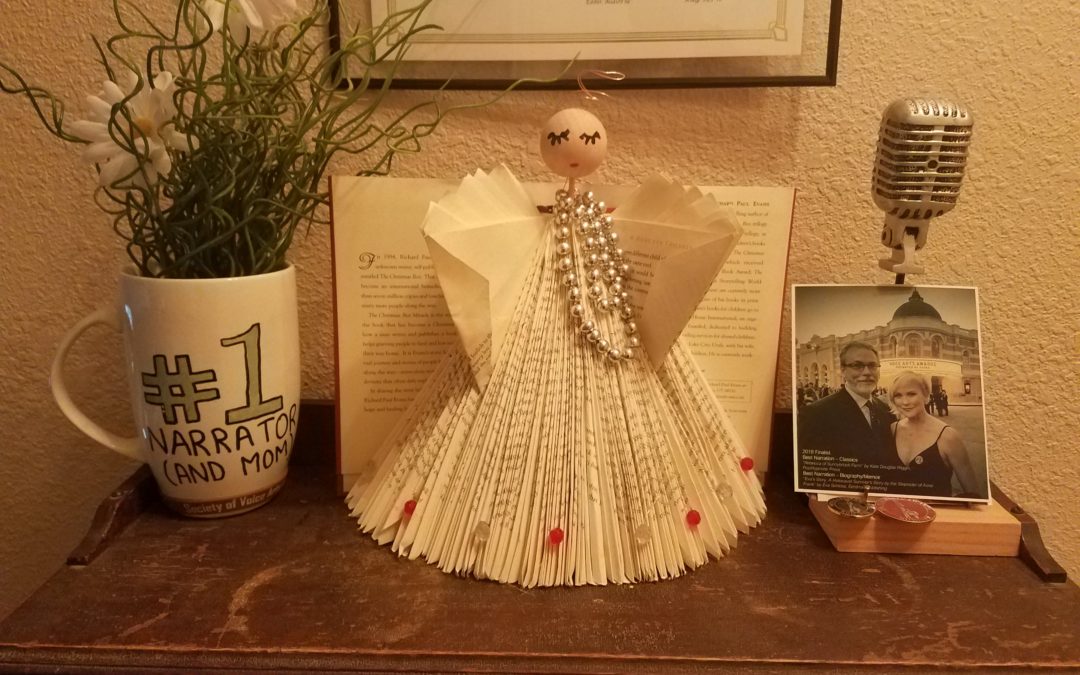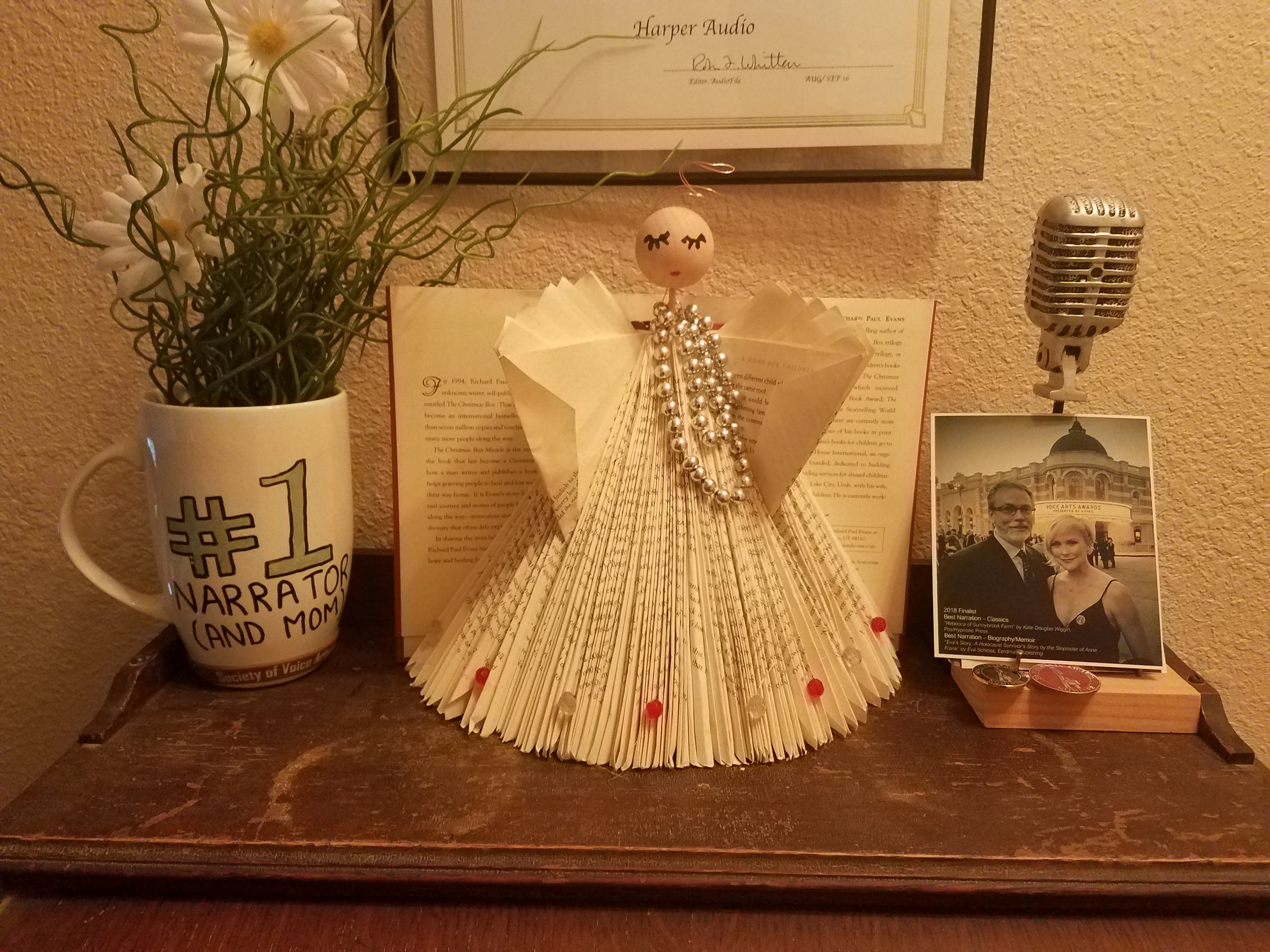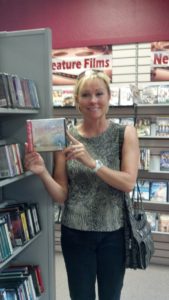by annmr | Jan 3, 2019 | Audiobook Production, Engaging with listeners, Narration Business Practices

A kind listener, a new friend, took the time to send me this gift of a classic I’d narrated…
This summer, my dear husband and I celebrated our 30th wedding anniversary in Sedona, Arizona. We love the area, the food, and the activities. We took a “Pink Jeep” tour into some Indian ruins and did a little hiking. Our guide, Don, was articulate, genial, knowledgeable, and devoted to his occupation. We enjoyed the short drive to our destination as we each introduced ourselves and shared a smidgen about ourselves. The other couple was a teacher and her husband who loved woodworking. My husband was able to share some discussion about his affinity for woodworking, and when it came time to tell about myself, I said I was an audiobook narrator. To my delight, the Jeep was full of enthusiastic readers and listeners! Don took us on a lovely tour of the ancient ruins and really piqued our interest in the local history. As he dropped us off at the end of the tour, he asked for my business card, and indicated he’d like to listen to one of my narrations. So, I gave him one and told him to email me and I’d help him pick one he’d likely enjoy.
About 2 weeks later, Don emailed me, and I helped him find an audiobook he’d be sure to enjoy. The classic “Rebecca of Sunnybrook Farm” by Kate Douglas Wiggin, was what he settled on, and I mentioned how much I enjoyed narrating it. I mentioned, however, that I had never been able to find the original print book in any bookstores or antique malls, and then wished him happy listening.
Fast-forward to December 31, when I drove to the post office and picked up my mail. A package was waiting for me, and lo ‘n behold, it was an old hard-back copy of “Rebecca of Sunnybrook Farm” sent by my friend, Don! He’d vacationed in New England over the fall and came across it in an antique store and remembering my lament at not being able to find one, he picked it up and sent it to me. How cool is that!?
That is just the tip of a HUGE iceberg of nice people I’ve gotten to meet and know over the years I’ve been a narrator. The overwhelming good will, camaraderie, and generosity of my peers, clients and listeners have kept me afloat many times when I felt like quitting.
Other side effects of being an audiobook narrator? Learning new words (at least to me) like “hirsute”, and “floccinaucinihilipilification”, and then trying to use them in casual conversation; knowing the proper way to say common abbreviations out loud, such as “I.E.”, texting shortcuts like “IKR”, and many Latin phrases, and TONS of biblical words. (All of this would make me seem a bit hoity-toity, if only I could remember them long enough to use them.) And the obvious draw, I got to read. All. Day. Long. I got to read the most fascinating books I would not have chosen for myself and broaden my horizons.
But one of the coolest side effects of being an audiobook narrator has been the ability to work from home and somewhat control my work schedule. I was able to be home in the afternoons when my boys came home from school, ready with a snack to get a recap of their day. I could take the dogs to their vet appointments mid-morning, and I could occasionally take off on a spontaneous afternoon fishing trip with my husband (knowing I’d be recording while they slept, to catch up and meet those deadlines.)
Aside from these wonderful benefits, I get the peace and joy of bringing an author’s words to life. That is really good for my soul.

by annmr | Dec 20, 2018 | Audiobook Production

The Angel in the Book
I could see the puffs of my breath in the light of the streetlight, as I quickly trotted two houses down to my neighbor’s home, awkwardly juggling a Christmas gift tucked under one arm, a bottle of wine under the other, and a fruit tart in my hands. The women in my close-knit cul-de-sac have been gathering together for years now for our monthly bunco night, reveling in each other’s company and catching up on milestones and events around the ‘hood.
I knocked on her door. A rush of warmth, laughter and delicious smells met me as I stepped into her beautifully decorated home. Exquisite desserts and appetizers covered every available inch of space on the counters and kitchen table, and the livingroom table was heaped in anonymous gift bags and boxes to be exchanged later, in lieu of our usual bunco game.
The laughter and stories around the dinner table made the food taste even better, somehow, and there was no rush as we moseyed into the livingroom, dragging kitchen chairs in and squeezing all of us around that pile of unmarked gifts. A quick group photo, and then the game began. Our hostess read a special poem with directional words included in it, and upon hearing those words, the gifts were passed around sometimes to the left, sometimes to the right. At the end of the piece, we each had a different gift than when we’d started. One at a time we opened them, and if we wanted, we could “steal” someone’s gift instead of opening the one at our own feet, and so it was that I was the owner (briefly) of a plush, furry blanket, an electric wine bottle opener, a Moscow Mule set (alcohol included!), until finally, with one woman left, that was stolen from me, too! I’d had my eye on another decadently soft, fluffy blanket, and had every intention to steal it, when I saw there was one unopened gift bag left and felt compelled to choose it instead of the petty larceny I had planned.
Out of the bag came a very beautiful angel, crafted skillfully from a book, it’s gown and wings formed by the folded pages. I, and many of my neighbors marveled at the coincidence of my ending up with that particular gift, since I am an audiobook narrator and thus, an avid book lover. Now, the premise of the gift exchange is anonymity, but I looked around those lovely faces in the circle and asked who made this gift that fit me so perfectly. The artist was across the room and raised her hand. She said, “I was thinking of you when I made that.” I got a little choked up as I thanked her, and with blurry eyes, looked it over again, and then gently placed it back in its bag.
The gift exchange over, we began to disperse, some of us refilling a wine glass or nibbling on an hors ‘d oeuvre, or just moving to chat with someone we hadn’t had a chance to talk with yet. The artist came over to sit by me and explain how the angel was made, and another neighbor came over and asked what book was used to make the angel. I brought her out of the bag and as I turned her over in my hands I froze, my heart stopping for a moment when I read the title of the book, “The Christmas Box” by Richard Paul Evans. In a flash I was transported to 1995, sitting by my father’s bedside in the hospital. The flashing lights of a heart monitor and the rhythm of the respirator breathing for him weaving a sad background to my voice, as I read this very same book aloud, to his unresponsive face. I remembered the smell of sterile equipment and the faint aroma of the peach lotion my sister and I had massaged into his feet and hands earlier in the day. But in the wee small hours of the morning, there I sat in his darkened room in the ICU, tears streaming down my face, as I read him this beautiful Christmas story about a widow and a young family that comes to live with her.
Quickly refocusing my attention on the here and now, and the book-angel in my hands, I couldn’t contain the sob that escaped me, and tears began to course down my cheeks. I was so embarrassed to be crying at this happy gathering, and felt my face grow red as I tried to squelch the emotions that overwhelmed me. My angel-maker gracefully and perceptively distracted me by describing how she crafted the gift, and I was so grateful for the chance to regain my composure, if only for a moment. I wanted to share with everyone how touched I was by this poignant coincidence, but every time I opened my mouth, my voice quavered in a high-pitched choking sound, and I would break down again. I think word eventually made it around the room, and my dear friends who were not clustered around me as I blathered, now all know the reason for my emotions.
The day after the party, as I write this, my emotions are still raw and near the surface, and I feel a headache coming on from the effort of keeping them under control. I need to get into my recording booth and finish narrating a book whose deadline is a bit too close for comfort, and if I cry, I lose half an hour of valuable work time, due to the drippy nasal tones that will be audible I my voice. I have placed my book angel outside my booth on my great grandmother’s antique sewing machine, which houses my recording equipment. There she will stay, long after the Christmas decorations have been put away in the garage. I am so grateful to have been in the presence of dear friends when this happened, and I am also grateful that the memory of my father is present with us this Christmas in a new and beautiful way.
“Never make fun of someone for mispronouncing a word. It means they learned it by reading.” Anonymous
Read more
by annmr | Jan 25, 2018 | Audiobook FAQs, Audiobook Production, Narration Business Practices, Narration Ethics, Narration etiquette

Putting in the time...
“Can I take you to coffee and pick your brain?” NO. READ THIS BLOG.
I began my narration career in 2008. That’s when the economy tanked and my job evaporated. I was lucky enough to have a husband with a stable job, and I now had the chance to finally figure out what I “wanted to be when I grew up”.
Having an unfinished degree in broadcast journalism, I decided to investigate if some aspect of that focus could work for me at this stage of my life. I attended a community education class about voiceovers and began voraciously researching the field. I read all the articles and columns I could find about it, listened to podcasts, took coaching and business mentoring in the voice over area, and was eventually directed to Recording For the Blind and Dyslexic, to volunteer narrating, in order to get a feel for audiobook narration. I was smitten. I knew it was what I wanted to pursue, and so I continued to volunteer recording for RFB&D (which is now known as “Learning Ally”).I joined the Audio Publishers Association and as many voiceover/narration/audiobook groups on social media that I could find.
It was a hell of a lot of work.
Good thing I’m a hard worker.
Now if you’re reading this, it means you must have some interest in checking out the field of audiobook narration; maybe you’re a friend from a former part of my life. The reason I’ve directed you to read this blog post is because people come to me more often than you’d think, wanting to pick my brain over coffee. Repeatedly, I’ve spent inordinate amounts of time crafting lengthy emails to friends who ask me about getting into narration, only to never hear from them again. So I finally decided to blog about it and simply invite inquisitive people to read it.
But why do I balk at being asked out to coffee for a brain-picking session? You’re asking for me to freely give the information I worked so very hard to learn and stay abreast of, for the price of a cup of coffee. My time is valuable, as is yours, no doubt. If I’m out having coffee, that means I’m NOT in the booth recording, or performing a myriad of functions that keeps my business running. I worked very hard to find out if this occupation would be viable, interesting, and something I could continue into my retirement years. You can do this too. If it’s important to you, you SHOULD do the footwork yourself. This is the best way to learn, and the lessons will stick far better than simply hearing about my experiences. Remember that old Chinese proverb: “Give a man a fish and you feed him for a day. Teach a man to fish and you feed him for a lifetime.”
An excellent starting point is to watch this video by acclaimed narrator, Sean Pratt.
https://www.youtube.com/watch?v=NPzPi-_0Xi8
He has narrated close to one thousand audiobooks, and is a narration coach. His advice is excellent.
Here are some additional helpful links to get you started:
www.narratorsroadmap.com (START HERE FIRST!)
www.audiobookmentor.com
https://www.deyaninstitute.com
https://patfraley.com
https://johnnyheller.com/
www.audiopub.org.
And if, after checking out these resources, you still want to spend time with me picking my brain about audiobook narration, my rate is $100 for a one-hour session. This is a very reasonable rate, and I will share with you what I have learned through my years of experience and hard work, plus answer your questions to the best of my ability.
by annmr | Jun 27, 2017 | Audiobook FAQs, Audiobook Production
 FREQUENTLY ASKED QUESTIONS ABOUT AUDIOBOOK CREATION
FREQUENTLY ASKED QUESTIONS ABOUT AUDIOBOOK CREATION
One day, my young son and I were shopping for a wedding gift for a friend. As always, I made my way to the audiobook section to see what was on the shelf. Lo ‘n behold, I was tickled pink to find one I’d narrated! It struck me then, that most folks have no inkling of how audiobooks are produced. Why should they? UNLESS YOU’RE AN AUTHOR.The audiobook industry continues to grow at an astounding rate, as evidenced by double-digit increases in sales annually. If an author neglects to plan for an audio version of his or her work, it’s tantamount to leaving money on the table. I’m relieved to say that many of today’s authors are very familiar with the benefits of releasing their books in audio format, and even bank on the popularity of the narrators they choose, to attract and build a loyal fan base. However, some authors are still unsure of what is involved in the creation of an audiobook, and this blog aims to answer the more frequently asked questions.
Q: Where do I begin?
A: There are two main avenues for audiobook publishing. For many rights holders the most popular route is through “Audiobook Creation Exchange”(www.ACX.com), which is Audible’s audiobook publishing platform and is owned by Amazon. (A rights holder is the person or entity that owns all rights required to make a book available for production and distribution as an audiobook. This may be the book’s author, a publisher, a literary agent, or the author’s estate.) For those rights holders who publish their books with a traditional publisher (for example, HarperCollins, Penguin Random House, etc.) those publishers will also usually produce the audio version of that book. Both of these avenues of producing audiobooks will ultimately list the audiobooks on Audible and iTunes for retail sale. For this blog, I will focus solely on audiobook production using ACX, and since most audiobooks are downloaded, I’ll skip over explaining about producing an audiobook on CD.
Q: How much will it cost me?
A: There are many factors that impact the cost of audiobook production. If you decide to use ACX to make your audiobook, your expenses are largely dependent on what you choose to pay your narrator. Rates for narration can be structured in three ways: royalty share, pay-per-finished hour, and a hybrid of the two where the rights holder and producer agree to a royalty share contract, but separate from ACX, agree to an additional pay-per-finished-hour contract.
Royalty share means that you pay nothing up front to your narrator, but when the book is sold, you and the narrator share a percentage of the profit. This can be up to 40%, split between the two (meaning the narrator and the rights holder each get up to 20% of the profits) But this is not quite an accurate view of earnings, as many audiobooks are purchased from Audible with credits. When a narrator auditions for a royalty share book, several factors are taken into consideration. Some of the criteria used to predict whether it will be worth the narrator’s time to record, include sales of the ebook, (not simply downloads, but actual sales), if the author has a robust marketing plan, the social media presence an author maintains, the genre of the book (paranormal romance will typically sell better than a non-fiction book about glaciers, for example), how prolific an author is, and if the book or author has won awards. Royalty share books will also attract newer narrators, as many of the more experienced narrators command compensation beginning at $250 per finished hour. Most narrators have experienced narrating at least one audiobook on royalty share basis, and never even came close to recouping decent payment on it.
If you choose to pay your narrator per finished hour, ACX has tiers of payment from which the rights holder can choose, which are calculated by how long your audiobook ends up being. These tiers are 0-$50, $50-$100, $100-$200, $200-$400, and $400-$1000, paid per finished hour. You may think that this is excellent pay for just reading aloud! But keep in mind the industry average seems to be that 6 hours are needed to record, edit, and master 1 finished hour of audio. (“Master” means to apply certain effects to the audio files to enhance the sound.) Depending on the narrator’s skill and the difficulty of the text this number could be less or greater than 6 hours. Obviously if your book contains complicated character names, numerous foreign words or phrases, or other text which requires additional research before narrating, it will take longer for the narrator to produce that one finished hour. Here’s an example: a non-fiction book chronicling the history of the pharmaceutical industry ends up being ten hours long. You can bet that the narrator had extensive research to do in order to make sure he/she could accurately pronounce all those company and drug names. All of that tricky verbiage will also slow down the narration process, and then the time spent editing will tend to be longer, as well, to make sure pacing and pauses sound natural. A book like this could take more than 60 hours to produce! So paying $200 per finished hour for a ten-hour audiobook is not exorbitant at all, when one considers the amount of work that goes into each production.
The third payment option that is cropping up more and more, is a hybrid deal, where the narrator agrees to perform the audiobook for royalty-share, and also enters into an agreement on the side (separate from ACX) in which the rights holder pays a per-finished-hour rate, usually much lower than what the narrator would normally agree to. For example, the rights holder and narrator agree to ACX’s royalty share agreement, but exchange emails on the side and establish an agreement for the rights holder to pay $100 per finished hour upon completion of the audiobook. (The amount the RH pays is not set in stone at $100 pfh. Hybrid deals are negotiated, so the RH could pay less or more than $100pfh + royalties.) ACX is aware of this practice, and has no issue with it.
Q: How much money will I make off of my audiobook?
A: It depends! Factors that affect how an audiobook sells include the popularity of the author as well as the narrator. Also the author’s marketing strategies and content of the book have significant impact.
Q: Should I narrate my own book?
A: You may be familiar with the phrase: “Don’t try this at home.” We are further cautioned that attempting to do whatever it is we’re watching that we think looks easy; we will probably end up with unfortunate results. The same phrase is a good rule of thumb for audiobook narration. While an author might think they would naturally be the best choice of narrator for their own work, this is usually not the case. The exceptions occur mostly in non-fiction, or in the rare instance that the author is an outstanding performer. Professional narrators study their craft, invest in professional training, and are able to connect with the text, often utilizing accents and other vocal techniques in order to best portray the author’s intent. A good narrator can believably portray both male and female voices by simply altering their breathing, tone and pitch, but it is often an acquired skill that the narrator has practiced and honed over time. In addition, most professional narrators are capable of operating their own recording software and have a good working knowledge of the various pieces of equipment needed to produce an outstanding recording. They typically invest thousands of dollars into high-quality equipment and in developing a sound-proof environment in their home, in which to record. They are cognizant of how certain foods and drinks affect their ability to enunciate clearly and without digestive “sound effects”, and also know how to care for their voice so that they sound consistent throughout the recording. A good narrator can often make the story an engrossing experience for the listener, whereas an untrained individual (even if they wrote the story!) may perform the text in such a way that the listener is bored, disinterested, or even irritated, and may ultimately quit listening, or even worse, write a bad review for the audiobook.
Q: Where can I find more information about the audiobook industry?
A: There is a wonderful organization called “Audiobook Publisher Association” or, the APA (www.audiopub.org). The website features news articles about the APA and the industry, and provides links to press releases and recent coverage organized by date.
There is also a magazine called “AudioFile” (www.audiofilemagazine.com) which is published six times a year. It is a print and online magazine whose mission is to review unabridged and abridged audiobooks, original audio programs, commentary, and dramatizations in the spoken-word format. The focus of reviews is the audio presentation, not the critique of the written material. AudioFile is a great resource to go to when one is looking for a publisher, narrator, or simply to keep up with the industry.
I hope this blog has proved enlightening about audiobooks and their production. I welcome your comments and questions!





 FREQUENTLY ASKED QUESTIONS ABOUT AUDIOBOOK CREATION
FREQUENTLY ASKED QUESTIONS ABOUT AUDIOBOOK CREATION